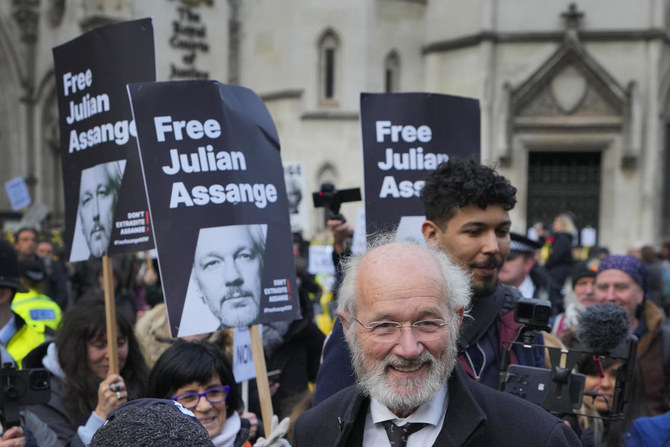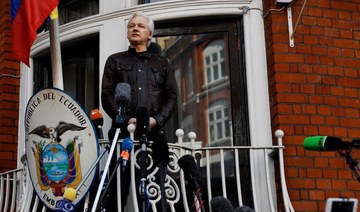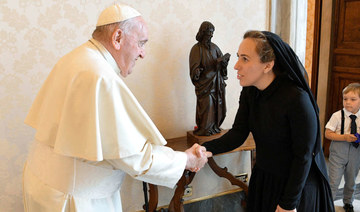LONDON: Julian Assange’s lawyers opened a final UK legal challenge Tuesday to stop the WikiLeaks founder from being sent to the United States to face spying charges, arguing that American authorities are seeking to punish him for exposing serious criminal acts by the US government.
Lawyer Edward Fitzgerald said Assange may “suffer a flagrant denial of justice” if he is sent to the US At a two-day High Court hearing, Assange’s attorneys are asking judges to grant a new appeal, his last legal roll of the dice in Britain.
Assange himself was not in court. Judge Victoria Sharp said he was granted permission to come from Belmarsh Prison for the hearing, but had chosen not to attend. Fitzgerald said the 52-year-old Australian was unwell.
Stella Assange, his wife, said Julian had wanted to attend, but that his health was “not in good condition.”
“He was sick over Christmas, he’s had a cough since then,” she told The Associated Press. She said The WikiLeaks founder was following proceedings through his lawyers.
Assange’s family and supporters say his physical and mental health have suffered during more than a decade of legal battles, including seven years in self-exile in the Ecuadorian Embassy in London and the last five years in the high-security prison on the outskirts of the British capital.
He has been indicted on 17 charges of espionage and one charge of computer misuse over his website’s publication of classified US documents almost 15 years ago. American prosecutors say Assange helped US Army intelligence analyst Chelsea Manning steal diplomatic cables and military files that WikiLeaks later published, putting lives at risk.
To his supporters, Assange is a secrecy-busting journalist who exposed US military wrongdoing in Iraq and Afghanistan. They argue that the prosecution is politically motivated and he won’t get a fair trial in the US
Hundreds of supporters holding “Free Julian Assange” signs and chanting “there is only one decision — no extradition” held a noisy protest outside the neo-Gothic High Court in London. Rallies were also held in cities around the world, including Rome, Brussels and Berlin.
“If Julian Assange is successfully extradited to the US, journalists the world over are going to have to watch their back,” said Simon Crowther, legal adviser to human rights group Amnesty International.
Stella Assange told the crowd the case was about “the right to be able to speak freely without being put in prison and hounded and terrorized by the state.”
Referring to the Russian opposition leader Alexei Navalny, who died in prison last week, she said: “What happened to Navalny can happen to Julian, and will happen to Julian if he is extradited.”
Stella Assange, who married the WikiLeaks founder in prison in 2022 — said last week that his health has deteriorated during years of confinement and “if he’s extradited, he will die.”
If the judges rule against Assange, he can ask the European Court of Human Rights to block his extradition — though supporters worry he could be put on a plane to the US before that happens, because the British government has already signed an extradition order.
Assange’s lawyers say he could face up to 175 years in prison if convicted, though American authorities have said the sentence is likely to be much shorter.
While several of Assange’s arguments against extradition have already been rejected by British courts, his lawyers are trying to make new points to secure an appeal.
Assange’s attorneys argued that the prosecution is politically motivated retaliation for WikiLeaks’ “exposure of criminality on the part of the US government on an unprecedented scale,” including torture and killings.
“The US was prepared to go to any lengths (including misusing its own criminal justice system) to sustain impunity for US officials in respect of the torture/war crimes committed in its infamous ‘war on terror,’ and to suppress those actors and courts willing and prepared to try to bring those crimes to account,” Assange’s lawyers said in written arguments. “Mr. Assange was one of those targets.”
Assange’s lawyers also want judges to reconsider allegations that the CIA developed plans to kidnap or kill Assange while he was in the Ecuadorian Embassy. A lower-court judge has dismissed the claims, but Assange attorney Mark Summers said Tuesday that there’s evidence “the plot was real.”
“There was a plot to kidnap Mr. Assange, to rendition him to America, or else straightforwardly murder him,” he claimed.
Fitzgerald added that “there is a real possibility of the return of a Trump administration” prepared to consider “extrajudicial attack, or worse” against Assange.
Lawyers for the US government will set out their case on Wednesday. James Lewis, representing the US, said Assange was being prosecuted “because he is alleged to have committed serious criminal offenses.”
He argued in written submissions that Assange’s actions “threatened damage to the strategic and national security interests of the United States” and put individuals named in the documents — including Iraqis and Afghans who had helped US forces — at risk of “serious physical harm.”
Assange’s legal troubles began in 2010, when he was arrested in London at the request of Sweden, which wanted to question him about allegations of rape and sexual assault made by two women. In 2012, Assange jumped bail and sought refuge inside the Ecuadorian Embassy.
The relationship between Assange and his hosts eventually soured, and he was evicted from the embassy in April 2019. British police immediately arrested and imprisoned him for breaching bail in 2012. Sweden dropped the sex crimes investigations in November 2019 because so much time had elapsed.
A UK district court judge rejected the US extradition request in 2021 on the grounds that Assange was likely to kill himself if held under harsh US prison conditions. Higher courts overturned that decision after getting assurances from the US about his treatment. The British government signed an extradition order in June 2022.
Meanwhile, the Australian parliament last week called for Assange to be allowed to return to his homeland.
The judges, Sharp and Jeremy Johnson, could deliver a verdict at the end of the hearing on Wednesday, but they’re more likely to take several weeks to consider their decision.
WikiLeaks founder Assange faces his last legal roll of the dice in Britain to avoid US extradition
https://arab.news/nhz3f
WikiLeaks founder Assange faces his last legal roll of the dice in Britain to avoid US extradition

- Hundreds of supporters holding ‘Free Julian Assange’ signs and chanting ‘there is only one decision — no extradition’
- Assange’s lawyers want judges to reconsider allegations that the CIA developed plans to kidnap or kill Assange while he was in the Ecuadorian Embassy
India shuts schools as temperatures soar

- India’s weather bureau has warned of “severe heat wave conditions” this week
- Sweltering heat has dipped voter turnout in India, where world’s largest election is underway
New Delhi: Indian authorities in the capital have ordered schools shut early for the summer holiday, after temperatures hit 47.4 degrees Celsius (117 degrees Fahrenheit) with Delhi gripped by a “severe heatwave.”
Delhi city officials asked schools to shut with “immediate effect” due to the blistering heat, according to a government order quoted by the Hindustan Times Tuesday, cutting short the term by a few days.
India’s weather bureau has warned of “severe heatwave conditions” this week, with the mercury reaching the sizzling peak of 47.4 degrees Celsius in Delhi’s Najafgarh suburb on Monday, the hottest temperature countrywide.
Authorities in other states — including Haryana, Madhya Pradesh, Punjab and Rajasthan — have also ordered schools close, Indian Today reported.
India is no stranger to searing summer temperatures.
But years of scientific research have found climate change is causing heatwaves to become longer, more frequent and more intense.
The Indian Meteorological Department warned of the impact of the heat on the health especially for infants, the elderly and those with chronic diseases.
In May 2022, parts of Delhi hit 49.2 degrees Celsius (120.5 Fahrenheit), Indian media reported at the time.
The next round of voting in India’s six-week-long election takes place on Saturday, including in Delhi.
Turnout in voting has dipped, with analysts suggesting the hotter-than-average weather is a factor — as well as the widespread expectation that Prime Minister Narendra Modi will easily win a third term.
India’s election commission has formed a task force to review the impact of heatwaves and humidity before each round of voting.
At the same time, India’s southern states including Tamil Nadu and Kerala have been lashed by heavy rains over the past few days.
Severe storms also hit parts of the country last week, including in the financial capital Mumbai, where strong winds flattened a giant billboard that killed 16 people and left dozens more trapped.
How cockroaches spread around the globe to become the pest we know today

- Study confirms German cockroach species found worldwide actually originated in southeast Asia
- Cockroaches may have stowed away with people to travel to Middle East, Europe, says study
DALLAS: They’re six-legged, hairy home invaders that just won’t die, no matter how hard you try.
Cockroaches are experts at surviving indoors, hiding in kitchen pipes or musty drawers. But they didn’t start out that way.
A new study uses genetics to chart cockroaches’ spread across the globe, from humble beginnings in southeast Asia to Europe and beyond. The findings span thousands of years of cockroach history and suggest the pests may have scuttled across the globe by hitching a ride with another species: people.
“It’s not just an insect story,” said Stephen Richards, an assistant professor at Baylor College of Medicine who studies insect genes and was not involved with the study. “It’s an insect and humanity story.”
Researchers analyzed the genes of over 280 cockroaches from 17 countries and six continents. They confirmed that the German cockroach — a species found worldwide — actually originated in southeast Asia, likely evolving from the Asian cockroach around 2,100 years ago. Scientists have long suspected the German cockroach’s Asian origins since similar species still live there.
The research was published Monday in the journal Proceedings of the National Academy of Sciences.
The cockroaches then globe-trotted via two major routes. They traveled west to the Middle East about 1,200 years ago, perhaps hitchhiking in soldiers’ breadbaskets. And they may have stowed away on Dutch and British East India Company trade routes to get to Europe about 270 years ago, according to scientists’ reconstruction and historical records.
Once they arrived, inventions like the steam engine and indoor plumbing likely helped the insects travel further and get cozy living indoors, where they are most commonly found today.
Researchers said exploring how cockroaches conquered past environments may lead to better pest control.
Modern-day cockroaches are tough to keep at bay because they evolve quickly to resist pesticides, according to study author Qian Tang, a postdoctoral researcher studying insects at Harvard University.
9 Egyptians go on trial in Greece over deadly shipwreck, as rights groups question process

- International human rights groups argue the defendants’ right to a fair trial is being compromised as they face judgment before an investigation is concluded
KALAMATA: Nine Egyptian men go on trial in southern Greece on Tuesday, accused of causing a shipwreck that killed hundreds of migrants and sent shockwaves through the European Union’s border protection and asylum operations.
The defendants, most in their 20s, face up to life in prison if convicted on multiple criminal charges over the sinking of the “Adriana” fishing trawler on June 14 last year.
International human rights groups argue that their right to a fair trial is being compromised as they face judgment before an investigation is concluded into claims the Greek coast guard may have botched the rescue attempt.
More than 500 people are believed to have gone down with the fishing trawler, which had been traveling from Libya to Italy. Following the sinking, 104 people were rescued — mostly migrants from Syria, Pakistan and Egypt — and 82 bodies were recovered.
Early Tuesday, police in riot gear clashed with members of a small group of protesters gathered in front of the courthouse and detained two people.
United Nations Secretary General Antonio Guterres has described the shipwreck off the southern coast of Greece as “horrific.”
The sinking renewed pressure on European governments to protect the lives of migrants and asylum seekers trying to reach the continent, as the annual number of people traveling illegally across the Mediterranean continues to rise.
Lawyers from Greek human rights groups are representing the nine Egyptians, who deny the smuggling charges.
“There’s a real risk that these nine survivors could be found ‘guilty’ on the basis of incomplete and questionable evidence given that the official investigation into the role of the coast guard has not yet been completed,” said Judith Sunderland, an associate director for Europe and Central Asia at Human Rights Watch.
Authorities say the defendants were identified by other survivors and the indictments are based on their testimonies.
The European border protection agency Frontex says illegal border detections at EU frontiers increased for three consecutive years through 2023, reaching the highest level since the 2015-2016 migration crisis — driven largely by arrivals at the sea borders.
France begins its first war crime trial of Syrian officials

- The Paris Criminal Court will try the three officials for their role in the deaths of two French Syrian men
PARIS: The first trial in France of officials of the Syrian regime of Bashar Assad is to begin on Tuesday, with three top security officers to be tried in absentia for complicity in crimes against humanity and war crimes.
The Paris Criminal Court will try the three officials for their role in the deaths of two French Syrian men, Mazzen Dabbagh and his son Patrick, arrested in Damascus in 2013.
“For the first time, French courts will address the crimes of the Syrian authorities, and will try the most senior members of the authorities to ever be prosecuted since the outbreak of the Syrian revolution in March 2011,” said the International Federation for Human Rights (FIDH).
The war between Assad’s regime and armed opposition groups, including Daesh, erupted after the government repressed peaceful pro-democracy protests in 2011.
The conflict has killed more than half a million people, displaced millions, and ravaged Syria’s economy and infrastructure.
Trials into the abuses of the Syrian regime have taken place elsewhere in Europe, notably in Germany.
But in those cases, the people prosecuted held lower ranks and were present at the hearings.
Ali Mamlouk, former head of the National Security Bureau, Jamil Hassan, former director of the Air Force intelligence service, and Abdel Salam Mahmoud, former head of investigations for the service in Damascus, are subject to international arrest warrants and will be tried in absentia.
Scheduled to last four days, the hearings will be filmed.
War crimes
At the time of the arrest, Patrick Dabbagh was a 20-year-old student in his second year of arts and humanities at the University of Damascus. His father Mazzen worked as a senior education adviser at the French high school in Damascus.
The two were arrested in November 2013 by officers who claimed to belong to the Syrian Air Force intelligence service.
“Witness testimony confirms that Mazzen and Patrick Abdelkader were both taken to a detention center at Mezzeh Military Airport, which is run by Syrian Air Force Intelligence and notorious for the use of brutal torture,” the International Federation for Human Rights said, stressing that the pair were not involved in protests against the Assad regime.
They were declared dead in 2018. The family was formally notified that Patrick died on 21 January 2014. His father Mazzen died nearly four years later, on 25 November 2017.
In the committal order, the investigating judges said that it was “sufficiently established” that the two men “like thousands of detainees of the Air Force intelligence suffered torture of such intensity that they died.”
During the probe, French investigators and the Commission for International Justice and Accountability (CIJA), a non-governmental organization, collected accounts of torture and mistreatment at the Mezzeh prison, including the use of electric shocks and sexual violence, from dozens of witnesses including former detainees.
Lawyer Clemence Bectarte, who represents the Dabbagh family and the International Federation for Human Rights, said the trial was a new reminder that “under no circumstances” should relations with the Assad regime be normalized.
“We tend to forget that the regime’s crimes are still being committed today,” she said.
France and Belgium support ICC request for arrest warrants of Israel and Hamas leaders

- If such warrants are issued, members of the court, could be put in a diplomatically difficult position
PARIS: France and Belgium released statements supporting the world’s top war crimes court’s request for arrest warrants for leaders of Israel and Hamas, after Israel and the United States both harshly condemned the effort.
On Monday, ICC prosecutor Karim Khan said he had requested arrest warrants for Netanyahu, his defense chief Yoav Gallant and three Hamas leaders, including its chief, Yahya Sinwar.
If such warrants are issued, however, members of the court, which includes nearly all countries of the European Union, could be put in a diplomatically difficult position.
“France supports the International Criminal Court, its independence and the fight against impunity in all situations,” the foreign ministry said in a statement late on Monday.
While US President Joe Biden called the legal step against Israeli officials “outrageous,” the French foreign ministry took a different stance.
It reiterated both its condemnation of Hamas’s ‘anti-Semitic massacres’ on Oct. 7 as well as its warnings over possible violations of international humanitarian law by Israel’s invasion of the Gaza strip.
“As far as Israel is concerned, it will be up to the court’s pre-trial chamber to decide whether to issue these warrants, after examining the evidence put forward by the prosecutor ... ,” the ministry said.


















